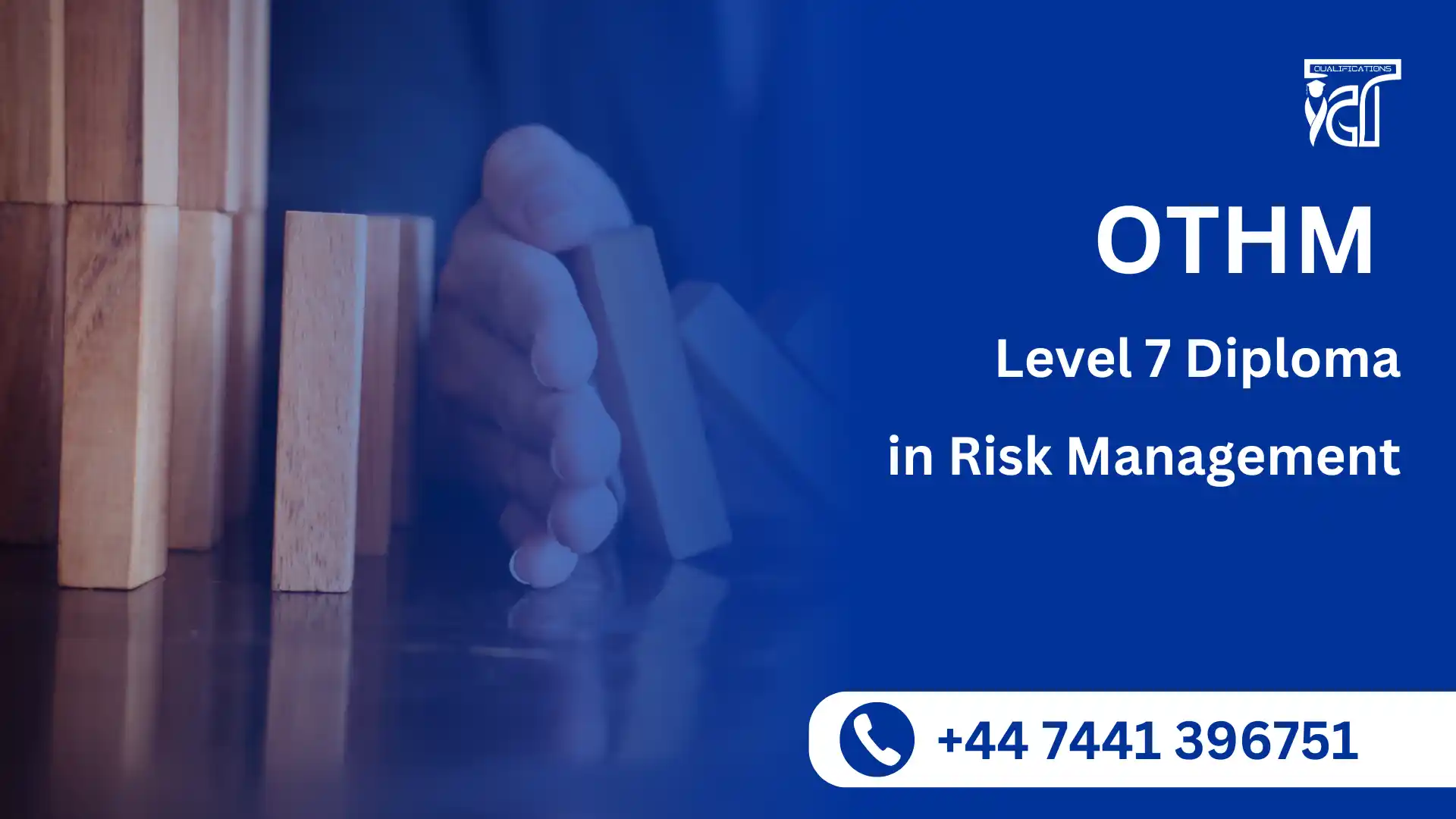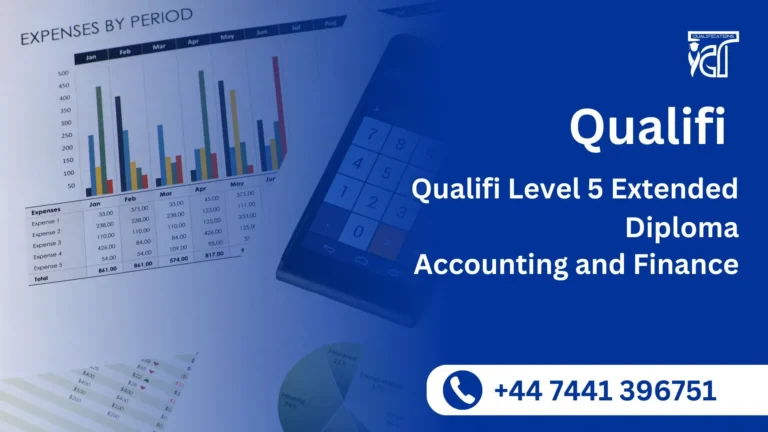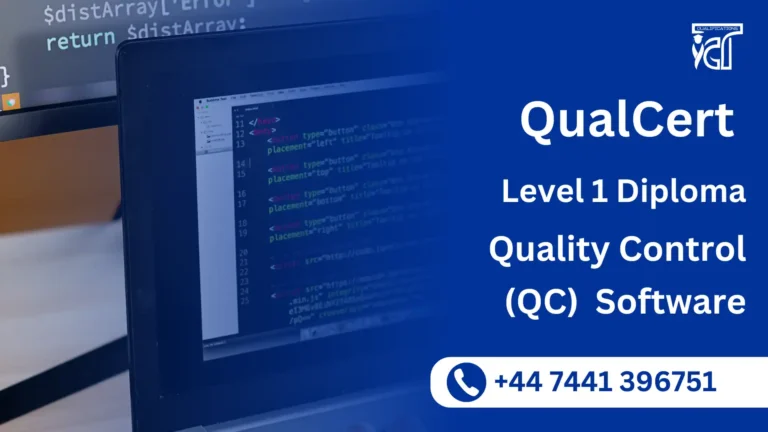In today’s rapidly evolving business environment, risk management is crucial for the success and sustainability of any organization. The OTHM Level 7 Diploma in Risk Management is an OFQUAL-regulated qualification that equips professionals with the skills and knowledge to navigate complex risk-related challenges. This assignment-based program is ideal for those looking to build a strategic approach to risk management and advance their careers in this critical field.
The OTHM Level 7 Diploma in Risk Management is a comprehensive postgraduate qualification designed for professionals who wish to enhance their understanding of risk management principles, strategies, and practices. OFQUAL-regulated, this qualification adheres to national standards, ensuring it meets high academic and professional benchmarks. The program is entirely assignment-based, meaning that students will be assessed through practical assignments rather than formal exams. This approach fosters a deeper, more applied understanding of risk management concepts.
This diploma is ideal for individuals looking to gain expert knowledge in managing various types of risks in an organization, including financial, operational, strategic, and reputational risks. It prepares professionals to assess risks, develop risk management strategies, and implement them effectively across industries such as finance, healthcare, and manufacturing.
The OTHM Level 7 Diploma in Risk Management offers professionals the knowledge, skills, and strategic insight needed to become experts in managing risks in today’s complex business environment. This OFQUAL-regulated, assignment-based qualification provides practical learning experiences that can be directly applied in real-world scenarios, making it an invaluable asset for anyone looking to advance their career in risk management.
OTHM Level 7 Diploma in Risk Management
The OTHM Level 7 Diploma in Risk Management comprises 6 mandatory units, totaling 120 credits, with a Total Qualification Time (TQT) of 1200 hours and 600 Guided Learning Hours (GLH) for the entire qualification.
| Sr# | Unit Title | Credits | GLH |
|---|---|---|---|
| 1 | Principles of Risk Management | 20 | 100 |
| 2 | Strategic Risk Management | 20 | 100 |
| 3 | Responsible Leadership and Governance | 20 | 100 |
| 4 | Organisational and Environmental Risk | 20 | 100 |
| 5 | Risk Analysis and Modelling | 20 | 100 |
| 6 | Advanced Research Methods | 20 | 100 |
GLH (Guided Learning Hours) and TQT (Total Qualification Time) are terms commonly used in vocational qualifications to help define the amount of time a learner is expected to spend on heir studies.
1. GLH (Guided Learning Hours)
GLH refers to the number of hours a learner spends being directly taught, supervised, or supported during their course. This includes the time spent in activities such as:
- Classroom instruction
- Practical workshops
- One-on-one tutoring or mentoring sessions
- Online learning sessions with tutor support
In other words, GLH represents the time that learners are actively engaged with their instructors or learning activities.
2. TQT (Total Qualification Time)
TQT represents the total amount of time a learner is expected to invest in completing a qualification, including:
- GLH (Guided Learning Hours): Time spent on direct learning, as explained above.
- Self-Directed Learning: This includes time spent on independent study, research, assignment completion, preparation for exams, and any other work the learner does outside of direct teaching hours.
TQT is a broader measure that includes all the time required to achieve the qualification. It helps learners and employers understand the overall commitment required for the qualification.
Key Differences Between GLH and TQT:
- GLH focuses on direct learning with guidance or supervision.
- TQT includes GLH as well as independent study time and other learning-related activities.
Example:
If a qualification has a TQT of 600 hours and a GLH of 250 hours, it means the learner should spend 250 hours in direct learning (classroom, online, or tutor-led sessions) and 350 hours on independent study or research.
Learning Outcomes of OTHM Level 7 Diploma in Risk Management
Principles of Risk Management
- Understand risk management principles.
- Understand key legislation frameworks that influence risk management decision making in an organisation
- Evaluate the scope and implications of risk management standards.
Strategic Risk Management
- Understand the concept of strategy risk and various types of strategy risk.
- Be able to review an organization’s strategy and risk plans.
- Understand the role of Corporate Social Responsibility and ethics in risk management systems.
- Understand the development, implementation and role of Business Continuity Planning with regard to corporate strategy
Responsible Leadership and Governance
- Understand the key sociocultural, ethical and moral issues that affect organizations in the current economic environment.
- Understand the role of leadership to manage strategic and operational risk in the organisation.
- Understand the importance of corporate governance in organizations.
- Understand the role and impact of corporate governance in the management of companies.
Organisational and Environmental Risk
- Understand the effects of risks on business organizations.
- Understand risk management function in organizations.
- Be able to prepare an effective risk management plan followed by an environmental screening.
- Understand risk control techniques.
Risk Analysis and Modelling
- Understand the concept of operational risk and Basel II model.
- Understand how to apply risk models to an organisational context.
- Be able to apply financial models to an organisational context.
Advanced Research Methods
- Be able to develop research approaches within a risk management context
- Be able to critically review literature on a relevant risk management topic
- Be able to design research methodologies.
- Be able to develop a research proposal.
The OTHM Level 7 Diploma in Risk Management offers numerous advantages for professionals seeking to advance their careers in risk management. Here are the key benefits of pursuing this qualification:
1. OFQUAL-Regulated and Industry-Recognized
The OTHM Level 7 Diploma is OFQUAL-regulated, ensuring it meets high academic and professional standards. This recognition guarantees that the qualification is respected by employers across the UK and internationally, providing you with a credible and reliable credential in the field of risk management.
2. Comprehensive Coverage of Risk Management Topics
The curriculum of the Level 7 Diploma covers a wide range of critical risk management topics, such as:
- Risk identification, assessment, and analysis
- Enterprise risk management strategies
- Crisis management and business continuity planning
- Risk communication and governance
- Legal and regulatory frameworks
This comprehensive approach equips you with the knowledge and skills needed to effectively manage risks across various sectors, ensuring that you can handle both current and emerging challenges in any organization.
3. Assignment-Based Assessment
Unlike traditional examination-based programs, the assignment-based assessment method allows students to demonstrate their understanding through practical assignments. This approach promotes a deeper, real-world understanding of risk management concepts, encouraging critical thinking and problem-solving. It is an ideal learning method for busy professionals who prefer flexibility over rigid exam schedules.
4. Practical, Real-World Application
The course is designed to ensure that students can apply their knowledge to real-world risk management scenarios. The assignments encourage you to tackle practical challenges, making the learning experience directly relevant to the workplace. This hands-on approach prepares you to make an immediate impact in your organization.
5. Enhanced Decision-Making and Leadership Skills
The diploma helps you develop essential leadership and decision-making skills in the context of risk management. You’ll learn how to make strategic decisions that protect your organization from potential risks while ensuring compliance with regulatory requirements. This expertise positions you for leadership roles in risk management, compliance, and governance.
6. Increased Career Opportunities
Risk management is a critical function for businesses worldwide. By earning the OTHM Level 7 Diploma, you open the door to higher-level career opportunities in industries such as finance, healthcare, insurance, and manufacturing. You can pursue roles like:
- Risk Manager
- Chief Risk Officer (CRO)
- Risk Consultant
- Compliance Officer
- Enterprise Risk Manager
This qualification significantly enhances your employability and makes you a more attractive candidate for senior positions in risk management.
7. Global Recognition
The OTHM Level 7 Diploma in Risk Management is recognized internationally, making it an excellent choice for professionals seeking to pursue careers abroad. The skills and knowledge gained through this qualification are applicable across industries and sectors worldwide, ensuring that you are equipped to manage risks in global organizations.
8. Flexible Study Options
The course offers flexible online and blended learning options, which makes it easier for working professionals to balance study with career and personal commitments. You can study at your own pace, allowing you to tailor your learning experience to your schedule and preferred learning style.
9. Boosted Professional Credibility
Completing the OTHM Level 7 Diploma will enhance your professional credibility and demonstrate your commitment to mastering the discipline of risk management. Employers will value the expertise and knowledge you gain, seeing you as a capable and well-rounded professional who can handle complex risk-related challenges.
10. Support from Experienced Tutors
Throughout the program, you will receive support from experienced tutors who are experts in the field of risk management. Their guidance will help you navigate the course material, clarify concepts, and ensure that you are well-prepared to complete your assignments successfully.
The OTHM Level 7 Diploma in Risk Management is designed for professionals who are looking to advance their careers in risk management or related fields. The ideal learner for this course possesses a combination of relevant experience, a strong desire to enhance their skills, and a commitment to strategic decision-making in risk management. Below are the key characteristics of the ideal learner for this qualification:
1. Experienced Professionals in Risk Management or Related Fields
The course is perfect for individuals who are already working in or have experience in risk management, compliance, business continuity, or other related areas. If you’re already in a role such as Risk Manager, Compliance Officer, or Insurance Manager, and want to enhance your expertise or progress to a senior position, this diploma will provide the knowledge and skills needed for career advancement.
2. Mid to Senior-Level Managers Seeking to Specialize in Risk Management
The ideal learner may be a mid to senior-level manager looking to specialize in risk management. Whether you hold a leadership role in operations, finance, or any other department, this qualification will deepen your understanding of how to effectively assess, manage, and mitigate risks within your organization. It will also prepare you for senior leadership roles like Chief Risk Officer (CRO) or Enterprise Risk Manager.
3. Business Professionals Transitioning into Risk Management
Professionals who are transitioning from other fields, such as finance, insurance, or operations, and are looking to move into risk management will find this course invaluable. The Level 7 Diploma is ideal for individuals who want to broaden their professional expertise and focus on the strategic aspects of risk management in a variety of industries.
4. Aspiring Consultants and Advisors
If you’re aiming to become a risk management consultant or advisor, this qualification will equip you with the skills and knowledge required to provide expert guidance to organizations. The diploma helps professionals understand the strategic and practical components of risk management, allowing you to offer valuable insights to clients across industries.
5. Professionals Seeking Career Progression
Individuals looking for career progression in the field of risk management, compliance, or governance will benefit from this qualification. The OTHM Level 7 Diploma is recognized globally and will increase your competitiveness in the job market, opening up more opportunities for senior positions and leadership roles within organizations.
6. Those Interested in Risk Management at a Strategic Level
The ideal learner is someone interested in taking a strategic approach to risk management. The course provides learners with the tools and frameworks to identify, assess, and manage risks at a high level. If you aim to influence organizational decisions, develop comprehensive risk strategies, and contribute to business continuity, this qualification will help you achieve those goals.
7. Self-Motivated and Independent Learners
The assignment-based structure of the OTHM Level 7 Diploma requires learners to be self-motivated, disciplined, and capable of working independently. The ideal learner is someone who is comfortable with conducting research, critically analyzing risk management theories, and applying them to practical situations. This is especially important for those who are juggling their studies with professional and personal commitments.
8. International Professionals Seeking Global Opportunities
Given the universal need for risk management expertise, the OTHM Level 7 Diploma in Risk Management is ideal for international professionals seeking to work in global organizations. The skills gained from this qualification are transferable across borders and industries, making it an excellent choice for individuals who wish to pursue careers in multinational companies, international organizations, or consulting firms.
Entry Requirements
Register Now
Qualification Process
Qualification Process OTHM Level 7 Diploma in Risk Management
- Self-Assessment:
Begin by evaluating your eligibility to ensure you meet the qualification requirements, including work experience, knowledge, and language proficiency. - Registration:
Complete your registration by submitting the required documents, including a scanned copy of a valid ID, and paying the registration fee. - Induction:
An assessor will conduct an induction to confirm your eligibility for the course and explain the evidence requirements. If you do not meet the criteria, your registration will be canceled, and the fee will be refunded. - Assignments & Evidence Submission:
Provide all assignments and the necessary evidence based on the assessment criteria outlined in the course. If you are unsure of the required evidence, consult with the assessor for guidance on the type and nature of evidence needed. - Feedback and Revision:
The assessor will review your submitted evidence and provide feedback. Evidence that meets the criteria will be marked as “Criteria Met,” while any gaps will be identified. You will be asked to revise and resubmit if needed. - Competence Evidence:
Submit final evidence demonstrating that all learning outcomes have been met. This evidence will be marked as “Criteria Met” by the assessor once it is satisfactory. - Internal Quality Assurance (IQA):
The Internal Quality Assurance Verifier (IQA) will review your evidence to ensure consistency, quality, and compliance with standards. - External Verification:
The IQA will submit your portfolio to OTHM External Quality Assurance Versifier (EQA) for final confirmation. The EQA may contact you directly to verify the authenticity of your evidence. - Certification:
Upon successful completion of all checks, OTHM will issue your official certificate, confirming that you have attained the OTHM Level 7 Diploma in Risk Management







